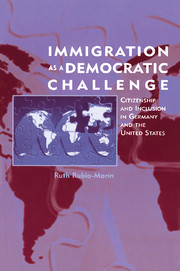Book contents
- Frontmatter
- Contents
- Acknowledgements
- 1 Introduction
- 2 A democratic challenge
- 3 Fair to whom?
- 4 Safeguarding liberal democracy from itself
- 5 Inclusion without consent
- 6 Keeping nationality relevant
- 7 The constitutional debate in the United States
- 8 The constitutional debate in Germany
- 9 Summary and final remarks
- Bibliography
- Index
- Index of Cases
6 - Keeping nationality relevant
Published online by Cambridge University Press: 22 September 2009
- Frontmatter
- Contents
- Acknowledgements
- 1 Introduction
- 2 A democratic challenge
- 3 Fair to whom?
- 4 Safeguarding liberal democracy from itself
- 5 Inclusion without consent
- 6 Keeping nationality relevant
- 7 The constitutional debate in the United States
- 8 The constitutional debate in Germany
- 9 Summary and final remarks
- Bibliography
- Index
- Index of Cases
Summary
Having presented and defended the claim to the automatic incorporation of resident aliens and explored some of the strongest objections against it, it is time now to analyse the specific modalities of inclusion embraced by the main claim to full inclusion and the secondary claim to automatic membership.
Disentangling rights from citizenship v. encouraging naturalization
Two paths have been most commonly proposed to overcome the increasing dichotomy between socioeconomic and political membership in those countries with large communities of permanent resident aliens. One way is to extend all the rights citizens currently enjoy, including political rights, to immigrants. The second is to encourage naturalization by liberalizing naturalization policies (Hammar 1990a). Generally, such paths are explored to ensure the incorporation of legal resident aliens only.
The alternative of encouraging naturalization has been said to be more in accordance with the generalized conception of democratic citizenship as membership, not just in any polity, but in the still dominant political unit in the international community: the nation-state. Such a conception is supposed to serve an inherently egalitarian ideal, according to which the members of the nation-state are united in a single status of membership. The international system already defines an external membership status which is based on national citizenship.
- Type
- Chapter
- Information
- Immigration as a Democratic ChallengeCitizenship and Inclusion in Germany and the United States, pp. 99 - 129Publisher: Cambridge University PressPrint publication year: 2000



